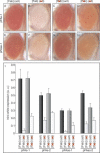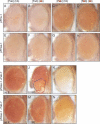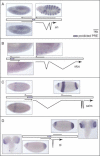Intergenic transcription through a polycomb group response element counteracts silencing
- PMID: 15741315
- PMCID: PMC1065723
- DOI: 10.1101/gad.326205
Intergenic transcription through a polycomb group response element counteracts silencing
Abstract
Polycomb group response elements (PREs) mediate the mitotic inheritance of gene expression programs and thus maintain determined cell fates. By default, PREs silence associated genes via the targeting of Polycomb group (PcG) complexes. Upon an activating signal, however, PREs recruit counteracting trithorax group (trxG) proteins, which in turn maintain target genes in a transcriptionally active state. Using a transgenic reporter system, we show that the switch from the silenced to the activated state of a PRE requires noncoding transcription. Continuous transcription through the PRE induced by an actin promoter prevents the establishment of PcG-mediated silencing. The maintenance of epigenetic activation requires transcription through the PRE to proceed at least until embryogenesis is completed. At the homeotic bithorax complex of Drosophila, intergenic PRE transcripts can be detected not only during embryogenesis, but also at late larval stages, suggesting that transcription through endogenous PREs is required continuously as an anti-silencing mechanism to prevent the access of repressive PcG complexes to the chromatin. Furthermore, all other PREs outside the homeotic complex we tested were found to be transcribed in the same tissue as the mRNA of the corresponding target gene, suggesting that anti-silencing by transcription is a fundamental aspect of the cellular memory system.
Figures






References
-
- Ahmad K. and Henikoff, S. 2002a. The histone variant H3.3 marks active chromatin by replication-independent nucleosome assembly. Mol. Cell 9: 1191-1200. - PubMed
-
- Beisel C., Imhof, A., Greene, J., Kremmer, E., and Sauer, F. 2002. Histone methylation by the Drosophila epigenetic transcriptional regulator Ash1. Nature 419: 857-862. - PubMed
Publication types
MeSH terms
Substances
LinkOut - more resources
Full Text Sources
Other Literature Sources
Molecular Biology Databases
